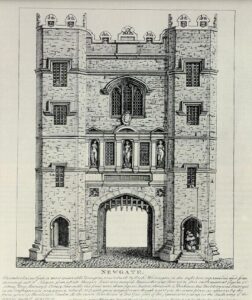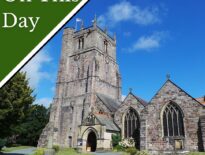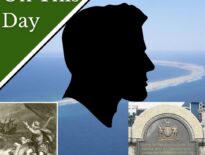Belchiam and his fellow friars at Greenwich had invoked Henry VIII's wrath by supporting Queen Catherine of Aragon during the king's Great Matter and by refusing the oath of supremacy. Belchiam had also reportedly called the king a heretic.
It was alleged that there was an earthquake at the time of Belchiam's death.
Sometime around 11th August 1534, the Friars Observant had been expelled from their monasteries. Eustace Chapuys, the imperial ambassador, recorded their expulsion in a letter to Charles V, Holy Roman Emperor:
"All the Minor Observant friars of this kingdom have been expelled from their convents, owing to their having refused to take the oath against the authority of the Apostolic See. They have, moreover, been distributed among the several convents in the provinces, where they are locked up, put in chains, and worse treated than if they were prisoners; indeed they would much prefer being in irons than in the hands of those under whose power they now are."
A document in Letters and Papers, records "Nomina eorumdem Observantium defunctorum", i.e. the names of the Observant Friars who died soon after:
"John Spens died at London; also Thos. Artte, Thos. Kellam, Jeremy Manson, John Kinge, John Kyxe and Nic. Harfforthe. Judocus Asterdam died at Canterbury; Andrew Danolde at Greenwich; John Scryvner at Reading; also Ant. Lenes. Alex. Hyll died in patria; Theodoric Barkham at Greenwich; James Wylyamson at Colchester; Cornelius Symondys in patria [prison]; also Edw. Pope and John Biltone. Wm. Ellell at Dancaster. Gerard Dyryson in patria. John Martyne at Newcastle. Rob. Bynkys at Reading. Fras. Caro at Bristol. Hen. Heltryne in patria; also Adrian Dehohe, Thos. Danyell and Fras. Carre. Lewis Wylkynson at Canterbury. Bryan Fysshborne at Yarmouth. Wm. Hasarde at Dunwyche. John Wells at Ipswich. Robt. Bakare at Doncaster."
There are also records of those who went into exile, those who moved to other places in England and those who were recorded as "exemptorum", or exempt.
In "The observant friars of Greenwich", in A History of the County of Kent, which draws on contemporary accounts, it says:
"On 17 June two cart-loads of friars drove through London to the Tower, and it is possible that some of the Greenwich Observants were among them. On or before 11 August the friars were expelled from their convent (though they seem to have made some kind of submission) and distributed in different places, generally in houses of the Grey Friars, where, wrote Chapuys to Charles V, ‘they were locked up in chains and treated worse than they could be in prison.’ Some, such as John Forest, were actually in prison in London. Two of them, inclosed in a poor lodging at the Grey Friars, Stamford, and treated as prisoners, were ‘in meetly good case as the world at this time requireth,’ and sent to London for their little belongings, including a new Psalter, a pair of socks, a penner and inkhorn. But the severity of their treatment is shown by the fact that out of 140 Observant Friars thirty-one soon died, and this does not account for all the deaths. Thomas Bourchier, who was a member of the Greenwich friary in the reign of Mary, gives details of several martyrdoms which probably belong to this time, though the writer assigns them to 1537. On 19 July Anthony Brdrbe [Brockby/ Browne?], formerly of Magdalen College, Oxford, a distinguished scholar, who had been imprisoned and tortured to such an extent that ‘for twenty-five days he could not turn in bed or lift his hands to his mouth,’ was strangled with his own cord. On 27 July Thomas Cortt, who had been imprisoned for a sermon against the king in the church of St. Lawrence, London, died in Newgate. On 3 [30]August Thomas Belchiam, a young priest, who had composed a book against the king, one copy of which he left in the hands of his brethren at Greenwich, died of starvation in Newgate. No mention of these three friars occurs in extant contemporary authorities, but Bourchier’s account representing the tradition of the Order is probably substantially correct, though the names may be misspelt."
Notes and Sources
- 'Spain: August 1534, 21-31', in Calendar of State Papers, Spain, Volume 5 Part 1, 1534-1535, ed. Pascual de Gayangos (London, 1886), pp. 248-252. British History Online http://www.british-history.ac.uk/cal-state-papers/spain/vol5/no1/pp248-252.
- 'Henry VIII: Miscellaneous, 1534', in Letters and Papers, Foreign and Domestic, Henry VIII, Volume 7, 1534, ed. James Gairdner (London, 1883), pp. 599-627. British History Online http://www.british-history.ac.uk/letters-papers-hen8/vol7/pp599-627.
- 'Friaries: The observant friars of Greenwich', in A History of the County of Kent: Volume 2, ed. William Page (London, 1926), pp. 194-198. British History Online http://www.british-history.ac.uk/vch/kent/vol2/pp194-198.




Leave a Reply